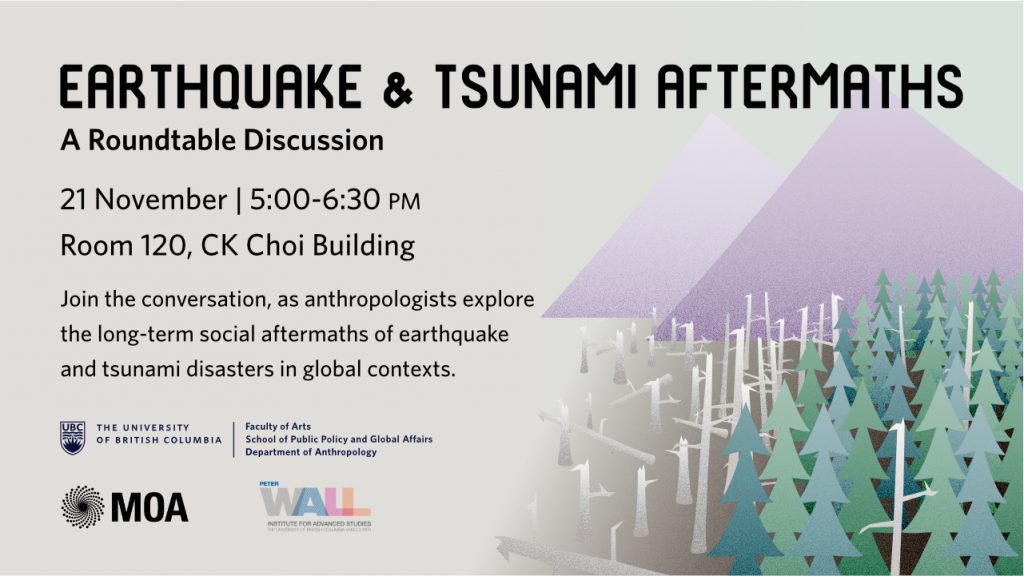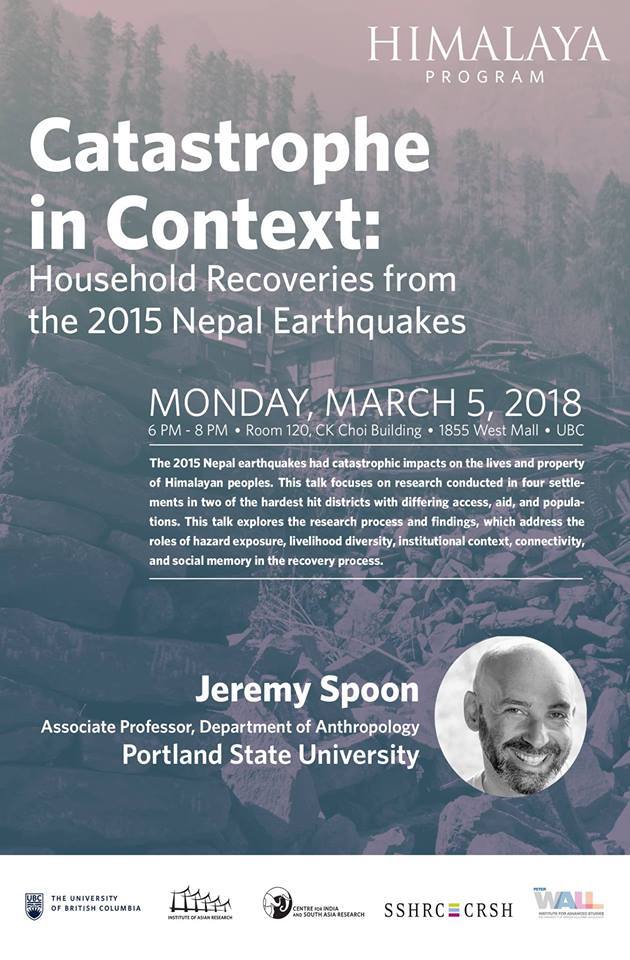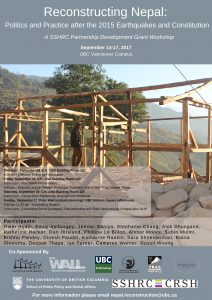Events and Workshops
On August 25th, 2020, Dr. Sara Shneiderman (Associate Professor in Anthropology and School of Public Policy and Global Affairs at UBC) presented a co-authored paper stemming from our SSHRC Partnership Development Grant at the web-based ‘National Symposium on Nepal’s Reconstruction (NSNR-2020) hosted by the Government of Nepal’s National Reconstruction Authority (NRA). The theme of the session was focused on ‘Private Housing — Housing Policy from beneficiary perspective.’ Paper Title: ‘House, Household and Home: Revisiting Social Science and Policy Frameworks through Post-Earthquake Reconstruction Experiences in Nepal’ Authors: Sara Shneiderman (University of British Columbia), Jeevan Baniya (Social Science Baha), Bina Limbu (Social Science Baha), Manoj Suji (Social Science Baha), Nabin Rawal (Tribhuvan University), Prakash Chandra Subedi (Social Science Baha), Cameron Warner (Aarhus University). Please find the recorded presentation here (approximate time 35:50-47:40). Two members from our partnership team, Manoj Suji (Social Science Baha) and Nabin Rawal (Tribhuvan University) presented at the The Annual Kathmandu Conference on Nepal and the Himalaya on July 31st, 2020 in Kathmandu, Nepal. The paper titled “Discourse of Post-Earthquake Heritage Reconstruction: A Case Study of Bhaktapur Municipality” explores the discourse of post-earthquake heritage focusing on how UNESCO World Heritage guidelines, and national laws as well as the involvement of different stakeholders affect heritage reconstruction. The paper explores the contested enforcement of international guidelines on heritage reconstruction, particularly in the case of Bhaktapur municipality in the Kathmandu Valley, and the impacts this has on community-led forms of reconstruction. Abstract: The first event is a public roundtable discussion on Earthquake and Tsunami Aftermaths, held at the UBC on November 21. This roundtable integrates diverse approaches to understanding the social elements of disaster aftermaths – with an eye towards producing useable knowledge in the present as we prepare for future disasters. The speakers will share their anthropological research in India, Sri Lanka, and Japan, followed by a response focused on Vancouver from the city’s lead seismic policy planner. A pre-event tour of the exhibit Shake Up: Preserving What We Value at the Museum of Anthropology gives participants an added perspective on Indigenous earthquake knowledge along the Northwest Coast, as well as the museum’s own earthquake preparations. The event is supported by the University of British Columbia’s Faculty of Arts, the School of Public Policy and Global Affairs, the Department of Anthropology, the Peter Wall Institute for Advanced Studies, and the Museum of Anthropology. The second is a panel presentation with several of the same speakers, called “Earthquake and Tsunami Aftermaths: Temporality and Transformation“. This panel was held in Vancouver, Canada on November 23 during the joint conference of the American Anthropological Association and the Canadian Anthropology Society. In addition to organizing the panel, Dr. Shneiderman gave a presentation titled “Deadlining: Restructuring, Reconstruction, and Transformation in Nepal,” which draws on the research conducted through the ‘Expertise, Labour and Mobility’ project. For more information, additional interviews, and a video of the roundtable at UBC, please follow this link. Several research team members presented at the 7th Annual Kathmandu Conference on Nepal and the Himalaya, 24-26 July 2019, as members of the panel “From Epicentre to Aftermath: Ethnographic and Historical Views of Post-Earthquake Nepal”. This joint panel was organized in cooperation with the project “After the Earth’s Violent Sway: the tangible and intangible legacies of a natural disaster” (SWAY), based at the University of London’s School of Oriental and African Studies (SOAS). Findings from both projects stimulated lively discussion amongst conference attendees. Research team member Bina Limbu discussed “… the rise of the one-roomed houses” and the ways that Nepal’s top-down reconstruction policies resulted in structures produced to meet housing grant guidelines, rather than the needs of earthquake-affected families. Another team member Manoj Suji demonstrated, through a paper co-authored with Philippe Le Billon and Dinesh Paudel, the social impacts of disaster financialization that continue to be felt in Nepal – transforming cultural activities and increasing vulnerability for large swaths of the population through processes of dispossession, as householders bore the brunt of the costs and risks of reconstruction. Jeevan Baniya, Anisha Bhattarai, and Sita Nepali explored discourses in Nepali newspaper od-ed pieces following the 2015 earthquakes and their role in creating ‘preferred’ viewpoints for understanding and critiquing the response and reconstruction. Members of the SWAY team presented topics in dialogue with those above – from Prof. Michael Hutt’s analysis of the effects of disaster on Nepalese politics to Prof. Mark Liechty’s critical re-consideration of ‘causality’ to John Whelpton’s comparative look at past earthquakes in Nepali consciousness. These presentations often contextualized Nepal’s current post-earthquake reconstruction with the country’s experience of major earthquakes in 1934 and 1988, adding historical depth to the findings from contemporary research. The partnership concluded a workshop in Denmark with a public symposium in Copenhagen on May 28th. This public seminar presented findings from our research project investigating the socio-political effects of Nepal’s 2015 earthquakes in dialogue with scholars working on disasters in other areas of the world. For more details, please find the event announcement here. Partnership members from our Canada and Nepal teams will be giving presentations during the SOAS (South Asia Institute) conference, “Epicentre to Aftermath: Political, Social and Cultural Impacts of Earthquakes in South Asia“, being held in London from January 11th-12th, 2019. Team members, Jeevan Baniya (Social Science Baha), Omer Aijazi (University of Toronto, Canada), and Sara Shneiderman (University of British Columbia, Canada) will be giving presentations regarding post-earthquake humanitarian responses, ownership and kinship in relation to the ‘home’, socio-political impacts of reconstruction, and disasters as betrayal. For a detailed list, please see below. The first day of the conference on January 11th will conclude with a keynote address given Dr. Sara Shneiderman (Associate Professor at the University of British Columbia in the Department of Anthropology and the Institute of Asian Research at UBC’s School of Public Policy and Global Affairs). Dr. Shneiderman’s presentation, “Restructuring Life: political, social, and material transformation in post-conflict, post-disaster Nepal“, will draw from 20 years of experience in the Dolakha district of Nepal to discuss transformation in the aftermath of natural disaster and political upheaval. To find more information on the conference and keynote address, please visit the conference webpage here. List of Paper Presentations: Omer Aijazi (University of Toronto): Disasters as Betrayal: the life that Niaz evokes. Jeevan Baniya (Social Science Baha): Socio-political impacts of reconstruction post-earthquake Nepal: A case study of Majhi community in Sindhupalchowk. Jeevan Baniya & Amrita Gurung: I/NGOs in humanitarian responses post-earthquake 2015: Empirical evidence from Gorkha, Sindhupalchowk and Southern Lalitpur. Sara Shneiderman (University of British Columbia, Canada), Jeevan Baniya (Social Science Baha, Nepal), Bina Limbu (Social Science Baha, Nepal), Nabin Rawal (Tribhuvan University, Nepal), Prakash Chandra Subedi (Social Science Baha, Nepal), Manoj Suji (Social Science Baha, Nepal), Cameron Warner (Aarhus University, Denmark): Householder, Homeowner, or Landowner? Rethinking Ownership and Kinship through Nepal’s Reconstruction Process. July 25-27, 2018 Hosted by Social Science Baha in Kathmandu, Nepal. Click here to view this year’s panels and sessions. Annual Conference on Nepal and the Himalaya 2018 March 5, 2018 Hosted by the Himalaya Program at the University of British Columbia, Vancouver, Canada. Click here for the event listing. Catastrophe in Context: Household Recoveries from the 2015 Nepal Earthquakes The 2015 Nepal earthquakes had catastrophic impacts on the lives and property of Himalayan peoples. Join the UBC Himalaya Program as Dr. Spoon discusses his study which focuses on four settlements in two of the hardest hit districts with differing access, aid, and populations. We randomly selected 400 households in these locations and conducted two ten-week research phases at nine months and 1.5 years after the earthquakes. Using household surveys, in-depth interviews, and focus groups, we assessed the roles of hazard exposure, livelihood diversity, institutional context, connectivity, and social memory in the recovery process. Employing multivariate statistics and content analysis, our study found that accessibility, hazard exposure, and livelihood diversity were the strongest drivers of recovery outcomes. We then triangulated our results in a series of local and national research return workshops with the study participants and key consultants 2.5 years after the earthquakes. Our findings can assist policymakers, practitioners, academics, and other stakeholders to better understand the dynamics of natural disaster recovery in rural mountain communities in Nepal, the Himalaya, and beyond Speaker Bio: Dr. Spoon is an Associate Professor of Anthropology at Portland State University and Senior Fellow at The Mountain Institute. His research focuses on indigenous ecological knowledge inside and around mountainous protected areas in the Nepalese Himalaya and the Western United States. He recently initiated a new project on social-ecological recovery after natural disasters in mountain ecosystems, focusing on areas with catastrophic impacts from the 2015 Nepal earthquakes. In all of these projects, he utilizes collaborative methods and applies research findings to tangible projects created in participatory ways. September 14-17, 2017 Hosted by the University of British Columbia, Vancouver, Canada. Schedule: (Click here for the full schedule) Reconstructing Nepal: Politics and Practice after the 2015 Earthquakes and Constitution Thursday, September 14 C.K. Choi Building Room 120 Friday, September 15 C.K. Choi Building Room 120 Nepal has been undergoing a political transition since the end of the Maoist-state civil conflict in 2006. Over 10 years later, a new constitution has been implemented and one of the three mandated elections to various levels of government has been completed. Dissension on the contours of federalisation is on the wane, and the country appears to be moving ahead. The talk will discuss whether this means the transition is coming to an end, and what the contours of the Nepali state are likely to be in the future. Saturday, September 16 C.K. Choi Building Room 120 Sunday, September 17 – Peter Wall InstituteNational Reconstruction Authority (NRA) Conference Presentation
Kathmandu Conference Presentation
November events on Earthquake and Tsunami Aftermaths
 Project lead Sara Shneiderman, Associate Professor in UBC’s Department of Anthropology and School of Public Policy and Global Affairs, organized and participated in two discussion forums on earthquake aftermaths.
Project lead Sara Shneiderman, Associate Professor in UBC’s Department of Anthropology and School of Public Policy and Global Affairs, organized and participated in two discussion forums on earthquake aftermaths.Joint conference panel with SWAY project in Kathmandu
May 28th Public Seminar at University of Copenhagen
Partners present at SOAS conference in London & Dr. Sara Shneiderman to give keynote address
Annual Conference on Nepal and the Himalaya
Catastrophe in Context: Household Recoveries from the 2015 Nepal Earthquakes
Start-Up Workshop
6:30PM – Introductions and Welcome Dinner for Participants
8:30AM-9:00 – Breakfast and Registration
9:00 – Welcome, Land Acknowledgment, Remarks
9:15-10:25 – Introducing the Project (Sara Shneiderman, Katharine Rankin, Philippe Le Billon). Chair/Discussant: Deepak Thapa
10:40-12:05PM – Re/Construction (Dan Hirslund, Bishnu Pandey, Katherine Hacker, Jeevan Baniya). Chair/Discussant: Stephanie Chang
1:05-1:55 – Community Partner Presentations (TRAS, Russil Wvong; NCSBC, Alok Dhungana). Chair/Discussant: Mark Turin
2:00-3:00 – Graduate Student Roundtable (Omer Aijazi, Emily Amburgey, Amber Moore, Ian Turner). Chair/Discussant: Katharine Rankin
3:15-4:40 – Finance and Law (Dinesh Paudel, Ratna Shrestha, Subin Mulmi, Cameron Warner). Chair/Discussant: Philippe Le Billon
5:30 – Keynote Lecture “Nepal’s Prolonged Transition: End in Sight?” by Deepak Thapa
8:30AM-9:00 – Breakfast
9:00-9:45 – Overview of Project Activities, Outputs, and Logistics (Sara Shneiderman, Katharine Rankin, Philippe Le Billon, Deepak Thapa)
10:00-12:00 Toolbox Dialogue: Discussion of Disciplinary Assumptions/Epistemologies – Facilitated virtually by the Toolbox team
1:30-3:00 – Thematic Small Groups: Construction, Finance, Law
3:15-4:00 – Student Engagement Plans
4:00-5:00 – Discussion of Publication Plans, Other Outputs
5:00-5:30 – Review and Wrap Up
9:30AM-11:30 – Wrap-up, Developing Task List and Timelines for Next Steps
2:00PM-4:00 – Community Forum in Nepali co-sponsored with the Nepal Cultural Society of BC (NCSBS) at UBC Robson Square Downtown campus (Jeevan Baniya, Subin Mulmi, Dinesh Paudel, Deepak Thapa)
Events
Jul 28, 2017
Events and Workshops



